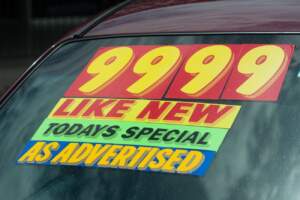When some people decide to buy a new car, most go immediately to a car lot, although a growing majority choose instead to go online and browse used cars for sale. The age of the Internet has made it easier than ever for buyers and sellers to come into contact, leading to 42.7 million used vehicles sold in 2017.
There are many reasons why you might decide to buy used instead of new. Used cars are typically cheaper and involve less hassle as far as paperwork. Used vehicles are also suited to younger and more inexperienced drivers, making them a common purchase by parents who need a car for their teenaged children. Whatever the reason you decide to buy used, asking these questions is essential to making an informed choice.
How much am I willing to pay?
This is one of the most crucial questions to ask before you even start looking. Setting a budget will make your search faster and easier as you’ll be able to look for specific price ranges online. It’s important to take other factors beyond the car’s flat price into account as well, including the costs of licensing and insurance.
There’s a little room for haggling in used car sales, so don’t feel discouraged if you see the perfect buy and it’s a little outside your price point. That said, be aware of how much you’re willing to spend and don’t get pulled into a sale beyond your budget.
What car size fits my needs?
This is a question that will fundamentally determine what kind of vehicle you’re looking for. If you drive by yourself most often, then you might be suited to a convertible or a small sedan. If you’re used to driving your friends and family around, however, then you’ll be looking for something like a van or a quad cab pickup.
Will I be towing anything?
As a question of utility, this is extremely important. A small vehicle can struggle with something even as light as a fully loaded flatbed trailer while pickup trucks exist on the market that can tow upwards of ten tons. If you’re used to towing people out of mud or being asked to help move, don’t expect that to change. Instead, take it into consideration ahead of time.
Do I need all-wheel drive?
This is a question that won’t be as important for drivers in high-population urban areas since the roads are usually clear enough to get by with only rear-wheel drive. If you’re living in a rural environment or often find yourself driving through mud and snow, then having all-wheel drive is important to keep your car from getting stuck.
What safety features can I not live without?
In used car sales, it’s common to view vehicles much older than you’d find on a lot. Plus, because safety regulations were much looser before the 1980s saw the advent of standard airbags, some vehicles won’t have the safety standards we’ve become accustomed to. Vehicles released in the 2010s feature equipment like automatic collision detection, which you’ll almost certainly be losing if you buy an older car.
That said, this is a question that really depends on your own personal driving habits. If you don’t drive particularly often or you consider yourself a safe driver, you can pass on safety features that you don’t find necessary.
Do I care about fuel efficiency?
This is a point that ties into budgeting. The gasoline used to keep your car running is an additional cost that you will need to take into account for as long as you’re driving it. If you already have a car that you’re intending to replace, a good way to gauge the fuel efficiency you need is to watch your odometer as you go about your weekly activities. After a week, compare the number of miles you’ve driven with the miles per gallon on the cars you’re looking at.
Typically fuel efficiency is relatively similar across makes, but higher mileages or a damaged engine can decrease a vehicle’s efficiency. You can and should order a VIN-based vehicle history report to see if previous maintenance has been performed on the engine that shows possible wear.
Does this car make me happy?
After you’ve calculated your budget, found a car and talked to the seller, you’ll probably be eager to make the deal. Before you do so, ask yourself this final question.
A used car, like any possession, should make you happy. You’ll likely be driving it for years, so buying a car that you aren’t satisfied with can throw a damper on the whole decade. It’s an important choice.
Your happiness depends on how informed you are when you make that choice. And by asking yourself these seven questions before you make a purchase you can make sure that you’re as informed as possible.

View Apart / Shutterstock



